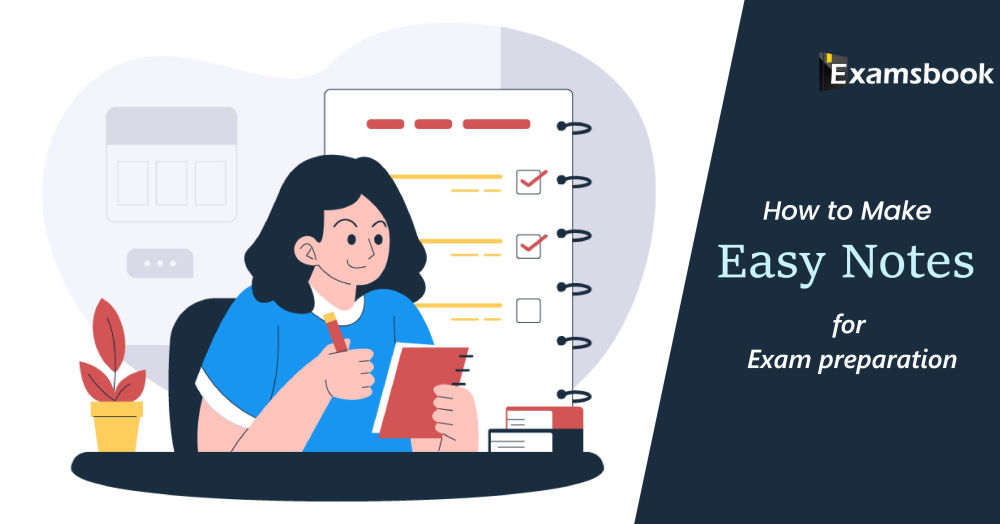How to Make Easy Notes for Exam preparation

MCQ questions could be more challenging in competitive exams and require a lot of memorization. You can only write in detail some pieces of information that seem important. You need to make smart notes before the exam to quickly revise and have a quick glimpse of the entire concept.
Making notes is difficult for many students, but proper planning for study notes and knowing some principles can go a long way in better exam preparation.
Five Benefits of Note Making
- You remain active and engaged during your lectures.
- Notes aid memorization with essential points.
- It is easy to read and revise at the last minute before the exam date.
- It helps with storing information.
- Proficiency in writing skills.
This blog explains how to take practical notes while studying. Making notes is a way of adding your own printed words and can help you retain more information, mainly if you summarize and explain it.
Essential Things to Save in Mind During Preparation of Notes for Competitive Exams:
Below are the some of points that you need to keep in mind while preparing your notes. Let's check -
No Notes on the First Lesson -
Know what to include in the notes? Because the purpose of the notes is to provide a quick summary; Thus, only the most critical information should be included while writing them. If you are comfortable, remind yourself of some topics by writing them in points.
The biggest mistake that students always make is that they start making notes on the first reading itself, which is improper.
When reading a book for the first time, sit down with a pen or pencil and underline essential concepts and formulas.
Do not write short notes on the first reading as you have to familiarize yourself with the book first, and only after the second reading will you understand what is important and what is not.
Take Care of Good Handwriting -
If you don't use digital mode and prepare notes with a paper pen, then definitely emphasize handwriting. Plus, there are many benefits to learning through writing, including improvements in cognitive and critical thinking abilities and increased attention span.
The simplest way to make your notes concise is to write them in points and sub-points, use diagrams and flowcharts, and use simple language and short sentences. The well-organized writing pattern allows a large amount of information to include in a single page.
Use Digital Method -
It is most accessible and secure to prepare notes digitally. Students can access them easily from anywhere, whether during breakfast, lunch, travel, or any event, and modify them. Many note-making apps on Windows, iOS, and Android are available to create docs and notes, such as ProofHub, Evernote, Bit.ai, ClickUp, Slite, Standard Notes, Apple Notes, and more.
Create notes, collaborate on them, and work smarter. Do it all with one tool—ProofHub!
Chart or Picture -
Most of the time, students get overwhelmed with book writing, after which they find it difficult to read and prepare notes, but there are some ways by which quick recall can be done in mind and time can be saved.
Cornell method: mainly used for short information
Mind maps: It is used to store large explanation regarding graphic information by using lines, symbols, and color. It is a brain-friendly concept.
Table format: It is widely used when there is a lot of information, and multiple things are to be covered, for instance, names of national parks, amendments, legislation, acts, etc.
Flow chart: It is used for sequencing the data in order. It helps to remember the flow of information.
Describing & Organizing -
The notion that notes should always be short is not true; you can make them quick by reading and thinking carefully after the description.
Follow a particular discipline while making short notes. Do not make notes everywhere and anywhere; keep them systematically in a specific file or notebook subject-wise or topic-wise.
Making random notes will create problems for you. Separating your notes or keeping them properly can save you time for revision.
Reread & Reviewing -
Only preparing notes will not be enough; it is also necessary that you read the notes on time and revise well.
A few days after making the notes, you get time to review them and your reactions. In such a situation, if there is a need for change, you will be able to do better.
Bottom Lines:
Now that we've discovered this much about notes making, it's time to learn how to incorporate these techniques into your daily routine for the best results.
Keep in mind that you cannot master note-making skills in a day. But the sooner you adopt this habit, the better it will be for you.
We wish you success in your future, and we would love to hear from you; you can write to us about your query by commenting below.
~All the Best~



